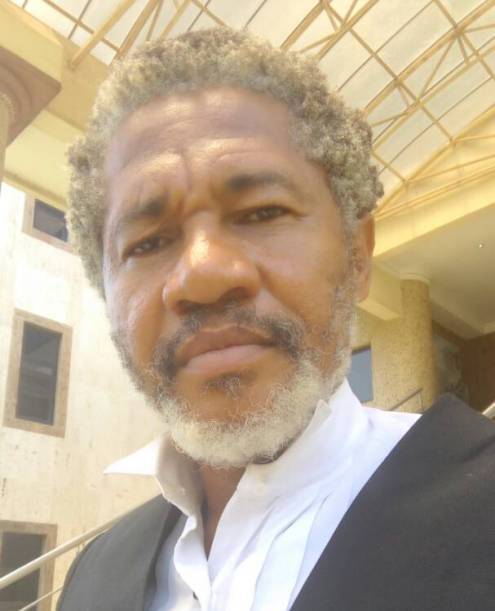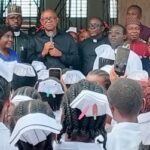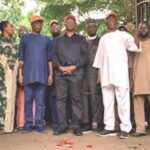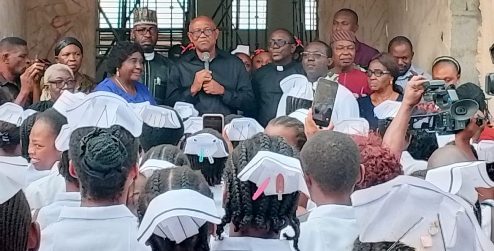
LAGOS OCTOBER 8TH (NEWSRANGERS)-I have pains takenly read the write up of the learned silk, Pastor Femi Atoyebi SAN on CAMA, 2020 and I am obligated without necessarily being legalistic to write a rejoinder particularly as it touches on Not-for-profit organizations (NFPOs) in Nigeria which my learned senior focused on in his write up. In my rejoinder , I shall be comparing notes with what obtains in the United Kingdom (UK) from where the National Assembly of Nigeria (NASS) imported the vexed issue of Government attempt to regulate NFPOs through the Corporate Affairs Commission ( CAC ) without the support of law , logic , morals or common sense .
While I agree with my learned senior that all Companies , Associations , Charities ,Non Governmental Organizations (NGOs) and NFPOs must be regulated by Government and its agencies for probity , accountability and the good of the public , I am of the school of thought that believes that such regulations must be fair , equitable , reasonable sustainable and justifiable in a democratic society . More importantly too I believe that such regulations must be based on a form, legal frame work or regime which is lacking in the Nigeria corpus juris , a lacuna my learned senior failed respectfully to factor into his write up. As it stands today, I make bold to say that the Charities , NGOs and NFPOs, in Nigeria are without form or legal backings . Apparently what Nigerians are confusing for Charities NGOs and NFPOs are mere associations as per S. 823 (1)(2) of CAMA,2020 , Part F which provides thus:
823. (1) Where two or more trustees are appointed by any community of persons bound
together by custom, religion, kinship or nationality or by anybody or association of persons established for any religious, educational, literary, scientific, social, development, cultural, sporting or charitable purpose, they may, if so authorised by the community, body or association (in this Act referred to as “the association”) apply to the Commission in the manner
provided for registration under this Act as a corporate body.
(2) Upon being so registered by the Commission, the trustees shall become a corporate body in accordance with the provisions of section 830 of this Part.
Incorporation of trustees of certain
communities, bodies
and associations.
In the unreported case of the Board of Incorporated Trustees of Malcolm Omirhobo Foundation V. The National Judicial Council of Nigeria & 6 Ors. Suit No: FHC/ABJ/CS/420/2019 , the Chief Justice of Nigeria Honorable Justice Onnoghen Nkanu Walter Samuel was standing trial at the Code of Conduct Tribunal over alleged non-declaration of assets in contravention of the Code of Conduct. While the case was
pending via an interim order the said sitting C J N was unilaterally suspended and removed from office by the President of Nigeria without the input of the National Judicial Council and the Senate. In his place Honourable Justice Ibrahim Tanko Mohammed was sworn in as the Acting Chief Justice of Nigeria and towards the expiration of his tenure as the Acting CJN , the NJC and the Federal Judicial Service Commission recommended him to the President to be appointed as the substantive CJN consequently the Plaintiff in the capacity of an NGO incorporated by CAC in line with her objects instituted a
public interest case via an originating summons praying the court to interpret the provisions of Sections 1 (1) (2), 231(4), 292 (1)(a)(i)(b) and Sections 153(1)(i), 158(1), paragraph 21 (a)(b) of part 1 of the Third Schedule of the 1999 Constitution of Nigeria vis a vis the suspension and removal of the CJN , his replacement and the misconduct of the Acting CJN who is being recommended for the office of the substantive CJN.
Honourable Justice I. E. Ekwo of the Federal High Court , Abuja held Inter alia : that the Plaintiff misconceived the
provisions of S.590(1) part C of CAMA ( now S. 823 (1)(2) of CAMA,2020 , Part F ) relied upon by her in arguing that by virtue of having been registered as a corporate person it is clothed with the status of an NGO. The court held that Nigeria does not yet have a statutory framework for the registration or operation of NGOs. His Lordship hope that the National Assembly will take serious note of this vacuum by taking a cue from other Commonwealth Countries like Belize (Non-Governmental Organizations Act, Chapter 315 of Belize), Uganda (The Non-Governmental Organisation Act, 2016, Uganda), and, Zimbabwe (Non-Governmental Organizations Act, Zimbabwe). His Lordship stated that these countries apart from having enactments that are similar to Part C of the CAMA do have separate enactments for N G Os. The court held that it is una
ble to see how Part C of the CAMA makes provisions for the registration of NGOs as claimed by the Plaintiff and consequently struck out the Plaintif’s case for want of locus standi .
To lend weight to the aforesaid judgement is the fact that the Charity Commission (Commission) in UK an equivalent of the CAC in Nigeria regulates and registers charities in England and Wales under the provisions laid out in the Charities Act 2011 ( Charities Act) while in Nigeria, apart from Sections 4 and 8 which respectively deals with the functions of the Board of CAC and the functions of the CAC and the 12 paged part F of CAMA 2020 , there is no Act or law that lays down the provisions under which CAC can regulate and register Charities , NGOs and NFPOs in Nigeria which exist in fact but not in.law . In the UK , the Charities Act and other laws defines what charity , charitable purpose and public benefit is but in Nigeria , there is nothing like that .
In the UK , apart from the Charities Act , there are the Charities (Protection and Social Investment) Act , the Companies (Audit, Investigations and Community Enterprise) Act , the Co-operative and Community Benefit Societies Act , the Corporation Tax Act
, the Taxation Chargeable Gains Act and the Equality Act .Transparency of Lobbying, Non-Party Campaigning and Trade Union Administration Act of 2014 on whose provisions the Charities Commission carries out her functions but in Nigeria there are none of such form, legal frame work or regime to aid the CAC in the performance of her functions.
With all humility, I refuse to agree with my learned senior that CAMA 2020 is eloquent or that it is necessarily a good law in all ramifications just because it comprises 870 sections spread over 604 pages covering apparently a wide range of areas on company law and related subjects. It is my humble view that the efficiency and effectiveness of a law cannot be determined from how lengthen or voluminous it is but rather from its transparency and sincerely of purpose which is lacking in S. 839 of CAMA 2020 and some other sections therein .
Furthermore , the fact that members of the National Assembly (NASS) who enacted CAMA 2020, are our representatives and comprises of people of all faiths, beliefs and prejudices, including Moslem clerics and Pastors, etc does not make them infallible, perfect and all knowing and consequently , I implore us not to judge them here by the oath of their office but by character of the content of the provisions of S.839 of CAMA 2020
I couldn’t agree more with my learned senior in his assertion that CAMA, 2020 seeks to regulate the conduct of businesses of all classes as it is the responsibility of government, which includes companies of all descriptions, associations, including charitable organizations such as churches, mosques, educational institutions, social clubs but I beg to disagree with him that it is the same laws that regulate the operations of Banks and Financial Institutions that regulates NFPOs . It is salient to note here that while the former are set up to make profit for private individuals the later are set up not to make profit but for the betterment of the public . I therefore humbly submit that it is anomalous to compare both forms of companies .
No doubt , CAMA 2020 is revolutionary in many respect especially with the ease of doing business in Nigeria which will inturn attract Foreign Direct Investment (FDI) into the country, if properly implemented as my learned senior opined , nevertheless it is my humble submission that CAMA 2020 , leaves a lot to be desired in the area of incorporated trustees as it concerns NFPOs, NGOs and Charities . In fact it’s drafters deserves some hard knocks for their lazy , callous, reckless , irresponsible and dishonest cannibalisation, bastardisation and importation of the UK Charities Act into the Nigeria legal space picking and twisting a few sections therefrom which favours the Government of the day’s draconian, autocratic and undemocratic tendencies .
No doubt the learned silk’s observation of the drama and the display of ignorance by some church leaders and Christains in reaction to S . 839 of CAMA 2020 is correct , nonetheless, in contemporary Nigeria , it will be wrong, hypocritical, unfair and naive for anybody to dismiss the fears of Christains on the mere ground of superstition alone . Even if the extant CAMA 2020 did not specifically mention church, mosque or any particular religion, there is no gain playing ostrich here because at the end of the day, the churches are more into charities than other groups in Nigeria and as long as they are part of the class of associations affected by CAMA 2020, they have every reason to be apprehensive bearing in mind the fact that we are living in a country where the entire judiciary is on trial. Where the Judiciary have been comprehensively bullied, cowed, dazed and overwhelmed by the executive to the extent that it is no longer independent and cannot act without fear or favour . During the recent visit by the delegates of a section of the Nigerian Christain community to the president at the presidential villa seeking for the amendment of S.839 of CAMA 2020, they reverberated the fears of many Christians when they lamented that they know that if they go to court to challenge the Act in issue , they will not get justice . But come to think of it , can any right thinking person blame them for their apprehension when the Department of State Services (DSS), in Nigeria through sting operation attacked judges of superior court of records in their residence , arrested them and threated them like common criminals and nothing happened ? Is not in Nigeria that a sitting Chief Justice was removed from office through a motion exparte order and the heavens did not fall? Is it not Nigeria where the judges are appointed by the president ? Is not Nigeria where appointments to public offices and institutions are not based on merit but on who you know , your connections or what part of the country that you come from ? Is not Nigeria where there is a deep cut in religious differences between Christains and Moslems ? Is it not Nigeria where the Government of the day is clannish and tribal to a fault ? Is not Nigeria where all major public institutions and offices in the country like the Armed Forces , para military institutions , the Police , NNPC AMCON , FIRS NIMASA, NPA , the judiciary , JAMB, NIDC, CAC, etc are headed and occupied by Moslems of Hausa/ Fulani extraction to the disadvantage of other ethnic groups? Is it not Nigeria where the Government of the day criminalize opositions and gag the the press ? I am stunned that my learned senior and many NIgerians fail to see the Wolf in S. 839 of CAMA and the fact that many Nigerian Christains are not just crying Wolf and thus must be taken serious .
Unfortunately and regrettably even though my learned senior and many egg heads fail to realise
that the entire S. 839 of CAMA 2020 which deals with the CAC suspension of Trustees, appointment of interim. managers etc is a Wolf in sheep cloth , I
for one do. My grouse of the said section is not centered on the mischief which the law intends to cure in Nigeria that is the none probity and accountability of NFPOs but on its nebulousness, politicalness , illegality and unconstitutionality.
The community Reading of S. 839 of CAMA , 2020 notwithstanding , it is difficult to construe the intention of the law makers using the literal rule of interpretation of statutes because its provisions is a maze of poorly drafted inelegant legal mumbo jumbo, full of contradictions concocted and conjured by the Nigerian Government to violate the fundamental rights of Nigerians to fair hearing, freedom of thought, conscience and religion and right to peaceful Assembly and of Association as enshrined and guaranteed by the 1999 Constitution of Nigeria . In the circumstance , the appropriate rule of interpretation of statute open to construe the intention of the law makers vis a vis the provisions of S. 839 is the mischief rule of interpretation of statute which considers the state of the law before the enactment , the defect which the statute sets out to remedy and/or prevent , the remedy adopted by the legislature to cure the mischief and the reason of or behind the remedy . To make headway in this extant case , we must positively suppress the mischief and promote the remedy within the intent of the statute . The mischief behind this provision is that before now there was no probity and accountability amongst many NFPOs in Nigeria . Many Trustees were converting monies meant for their associations for personal use, buying private jets, luxurious cars and houses , building private schools of their own , converting and applying their associations monies for things that are not in line with their objects or for the benefit of the public . Associations properties are seen as family properties of trustees who will them to their children and wives. There was the case of a church pastor who while divorcing his wife settled her with part of the church properties abroad. All these resulted in the lost of public confidence in the NFPOs and consequently the need for the Government to intervene through the passing into law S.839 of CAMA to regulate the activities of NFPOs . The regulation of the affairs of NFPOs by Governments all over the world is normal , in fact in England as far back as 1601 when monies that were given for charitable purposes were misapplied or mismanaged, the situation was remedied by the British Government via the Statue of Elizabeth of 1601 which established a commission to hear complaints about charities and in its Preamble, set out what purposes were considered to be charitable. It is also very normal for Governments to establish regulatory bodies through the enactment of laws to monitor , manage and supervise NFPOs by giving them powers to so act and the powers so given to the regulatory bodies are spelt out in written laws which is justifiable in a democratic society so that the regulatory bodies do not act arbitrary at their own whims and caprises or under the influence of any political office holder .
In the UK , Charity law have continued to evolved for over 300 years through both legislation and codification of case law and is still evolving . The Charities Act principally governs charities in England and Wales . The Charities Act defines charity and went on to spell out the list of charitable purpose. The Charity Act established the Charity Commission ( Commission ) which is a non-ministerial government department and a body corporate in its own right. The powers, duties and responsibilities of the commission are set out in black and white in the Charities Act . The Commission regulates and registers charities in England and Wales under the provisions laid out in the Charities Act (as amended by the Charities (Protection and Social Investment) Act ) 2016. The commission carry out general monitoring , regulatory advice and guidance of charities as part of its regular casework , conduct statutory and regulatory compliance investigations on charities. via inquiries .Where there has been abuse of non-compliance in charities and it is not severe , the commission advise and guide the affected charities to put them back on their right footings without using legal powers to intervene but if the abuse and non compliance is severe involving misconduct or mismanagement the commission may invoke her temporary protective power of suspending or removing a trustee, freezing a charity’s bank account and appointing an interim manager
to protect the charity property while it continue with investigation . The Charities Commission in certain respect have the same jurisdiction as the high court of England . The Commission undertakes a number of quasi-judicial functions like establishing a scheme for the administration of a charity; appointing, discharging or removing a charity trustee or trustee for a charity, or removing an officer or employee;
vesting or transferring property, or requiring or entitling any person to call for or make any transfer of property or any payment, restrict transactions a charity may enter in and appoint additional trustees.
The commission remit does not extend to investigating criminal or taxation matters . Nor is it a prosecuting authority. Where there is the commission of a crime or or abusive tax arraignment the commission make a referral for investigation to the police and other regulators or law enforcement agencies. In the process of her inquiry the commission ensures that the trustees of charities under investigation are given fair hearing and their right to appeal are made known to them . All the above qualities are lacking in CAMA 2020 where the CAC is accuser, the prosecutor and the judge .
I therefore submit that without a rich and robust law like the Charities Act and other supporting legislation as those in the UK in place in Nigeria , there is nothing upon which the CAC can exercise her highly subjective powers to by order suspend the trustees of an association and appoint an interim manager or managers to manage their affairs where the CAC reasonably believes that —
(a) there is or has been any misconduct or
mismanagement in the administration of the
association;
(b) it is necessary or desirable for the purpose of —
(i) protecting the property of the association,
(ii) securing a proper application for the property of
the association towards achieving the objects of
the association, the purposes of the association
of that property or of the property coming to the
association,
(iii) public interest; or
(c) the affairs of the association are being run fraudulently . In the circumstance , the CAC will only be functioning on its own whims and caprises because obviously the 12 pages of legislation on incorporated trustees as per part F of CAMA , 2020 will certainly not do .
To cheer the CAC on without the necessary work tools is dangerous and inimical to fundamental rights to fair hearing, freedom of thought, conscience and religion and right to peaceful assembly and Association of Nigerians . Granted that these rights are not absolute and can be derrogated or restricted by law , I confidently submit that S 839 of CAMA do not qualify as one of such laws that can restrict the fundamental rights of Nigerians to freedom of thought, conscience and religion and right to peaceful assembly and Association because it is not reasonably justifiably and sustainable in a democratic society for want of form , legislation , legal frame work and/or regime .
Without legislation on the establishment and operations of NFPOs in Nigeria, setting out the principles , rules, guidelines and the do’s and don’ts for the government and governed to follow , the arguement of regulating NFPOs in Nigeria in good faith a over board can not succeed because it will amount to putting something on nothing and expect it to stand . It will definitely not stand. It will fall .










